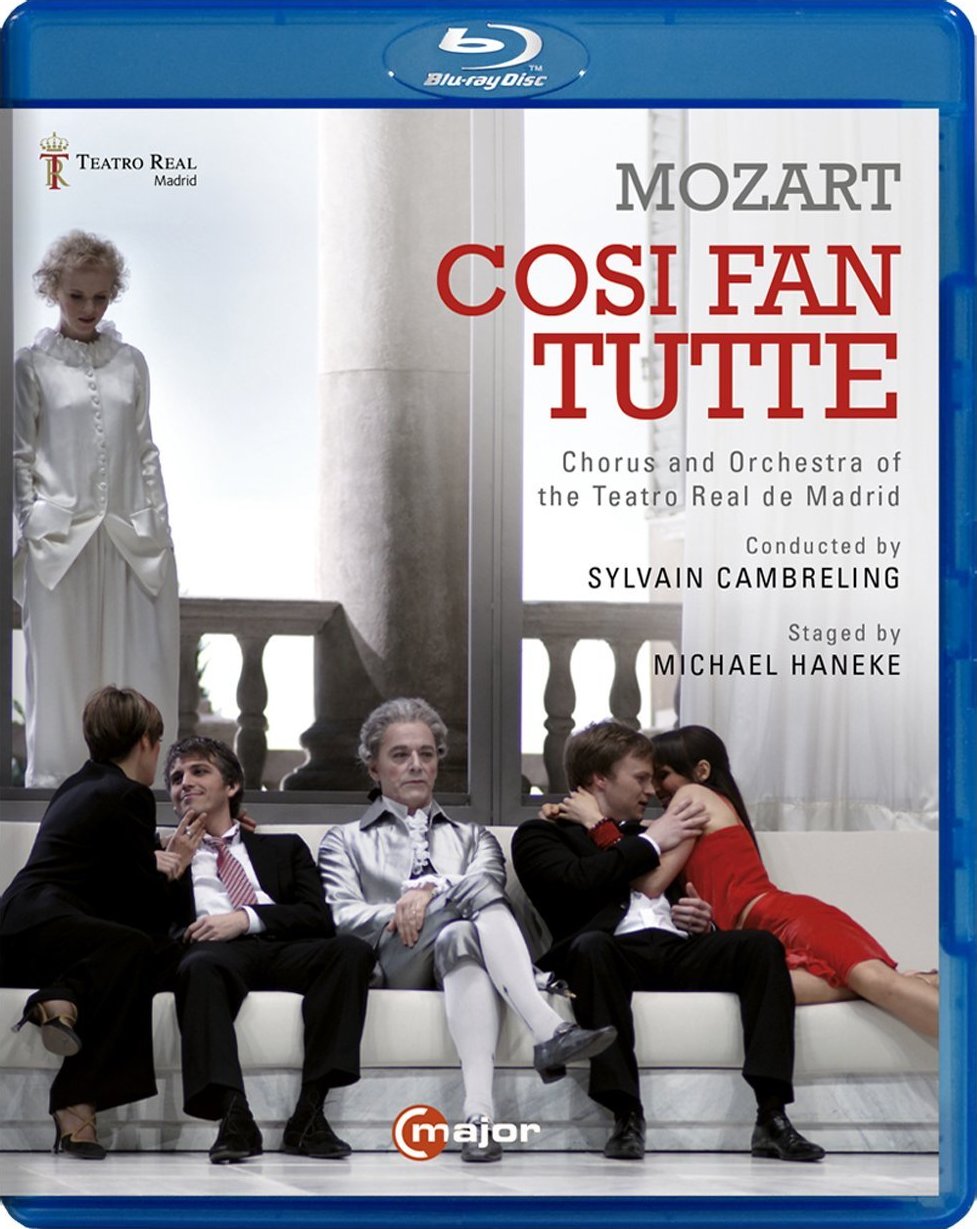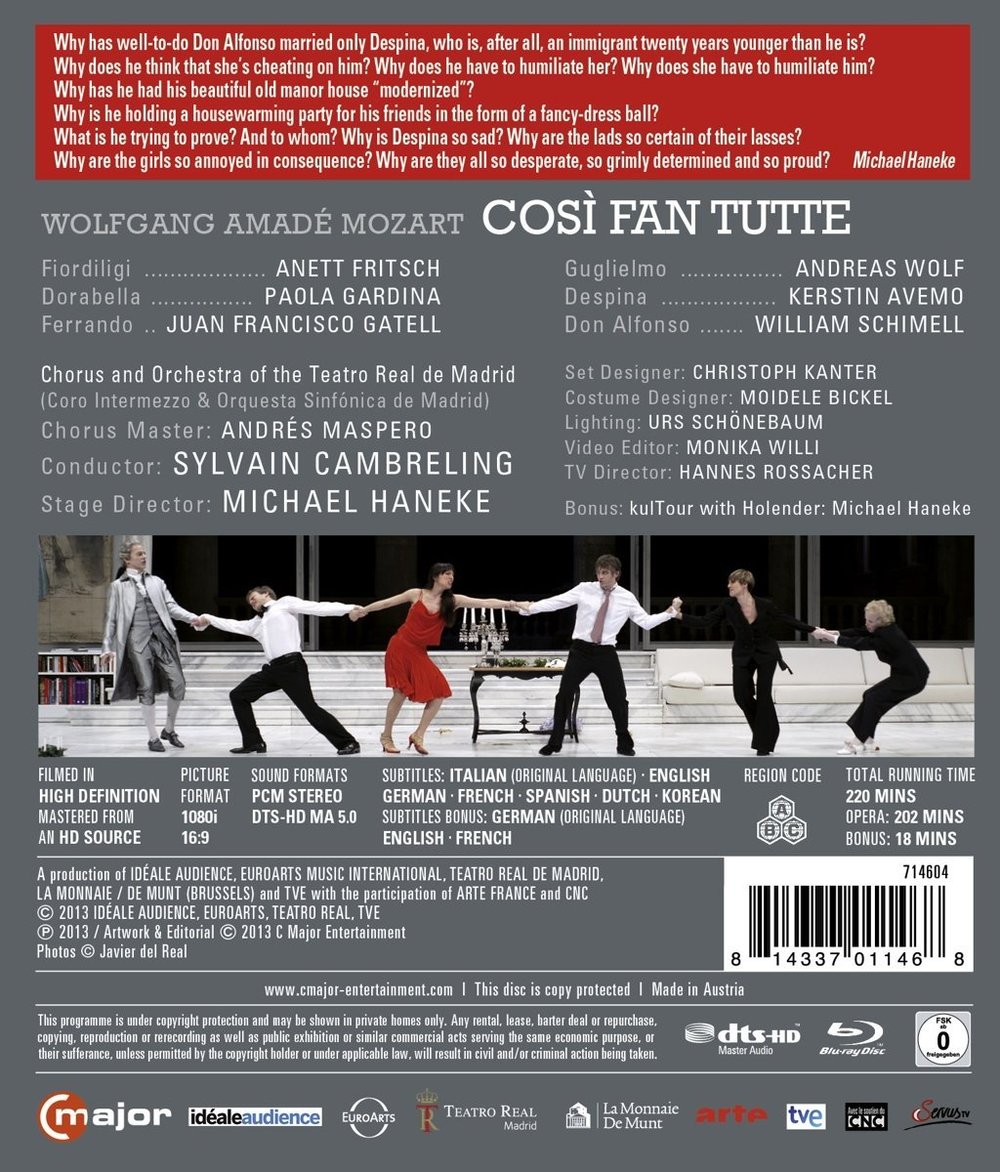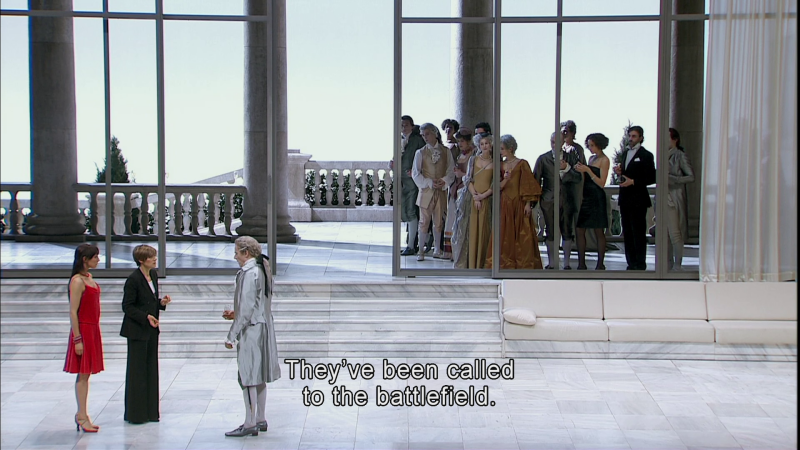

Mozart Così fan tutte opera to a libretto by Lorenzo Da Ponte. Directed 2013 by Michael Haneke at the Teatro Real de Madrid. Stars Anett Fritsch (Fiordiligi), Paola Gardina (Dorabella), Kerstin Avemo (Despina), Juan Francisco Gatell (Ferrando), Andreas Wolf (Guglielmo), and William Shimell (Don Alfonso). Sylvain Cambreling conducts the Orchestra and Chorus of the Teatro Real de Madrid (Chorus Master Andrés Maspero). Pianoforte by Eugène Michelangeli. Sets designed by Christoph Kanter; costumes b—by Moidele Bickel; lighting by Urs Schönebaum. Directed for TV by Hannes Rossacher; video file edited by Monika Willi. Released 2013, disc has 5.0 dts-HD Master Audio sound. Grade: C-
Michael Haneke, who declares himself to be a realist, directed the famous art-house movie Amour, a harrowing but touching tale of the horrors of growing old. Here are a few words about Haneke's realistic approach to Così fan tutte from Fred Cohn, writing in the May 2014 Opera News at page 66: "I did not enjoy this Così. There's no pleasure to be found in Haneke's Naples, no potential for sensuous delight. It is a place where sex can bring only pain. But the production vividly explores the work's disturbing, and often ignored, element of cruelty." Richard Lawrence was a bit more favorable in his April 2014 review in Gramophone at pages 115-116. Lawrence states, "Within the limits of Haneke's very particular view of the opera, the acting is perfect, and it's beautifully caught by Hannes Rossacher, the TV director."
I'll go even further than the print critics. Although Haneke appears (in the bonus extra to this production) to be a mild-mannered and affable gent, his approach here is that of a complete cynic. He turns the relationships of the two sisters and their men into a wife-swapping party even before the couples can get married. Don Alfonzo and Despina are in a sado-masochistic marriage (that they both relish and detest) but which will last as long as they can work together to contrive situations with voyeuristic opportunities. Like a vampire couple, they drain all humor out of the Così libretto until it lies bone-white on the floor. There is only one mild laugh heard from the audience during the entire show. Now to screenshots. Pay attention — at the end of the screenshots there is a pop quiz from Haneke himself (that you can find on the back cover of the keepcase.)
Here Così opens with Don Alphoso (William Shimell) and Despina (Kerstin Avemo) seen in the center greeting guests at a house-warming party at their newly-modernized old mansion. (Haneke states in the keepcase booklet that the Don and Despina are married and why they are having the party.) We are in modern times, but the hosts and some of the guests are dressed in 18th century costumes:
All the guests are seniors except for two young engaged couples (who are in for a special treat). Here we meet Guglielmo (Andreas Wolf) and Fiordiligi (Anett Fritsch), busy having a lovers' spat:
Next we meet Ferrando (Francisco Gatell) and Dorabella (Paola Gardina), who is also not happy. In the libretto, Fiordiligi is the strong, intellectual sister and Dorabella is the girl who can't say no. But Haneke flips this by presenting Fiordiligi as a sexpot and dressing Dorabella like a certified public accountant:
The girls are bored but they sense that they have been invited to spice things up. Below is the innocent scene in the libretto where the sisters sit together in private (no man around) and chat about the portraits they have of their handsome lovers. But here the girls provide quite a PDA (public display of affection) while their hosts, standing right behind them, gaze down on the action:
Don Alfonso bets that he can prove the girls to be unfaithful, and the men are game to cooperate:
The other guests have been socializing in the ballroom. They come out whenever something happens with the youngsters:
I include the next screenshot mostly so you can see the whole elegant set:
Despina isn't a simple servant. She and her Don are trapped in a grueling love-hate relationship. To make this fit the text, Haneke would have to revise the libretto. But this would be a very expensive step that no opera house would finance. Even cutting costs something, so Haneke sticks to the words of Da Ponte (which most viewers will not understand very well anyway). This results in ridiculous scenes like this:
The girls are desolate:
This opera was once called The School for Scandal. Now the Don is the Dean of the school and Despina is teaching Scandal 101 while making snide remarks and pleasuring herself:
Next we come to the great problem of all radically updated versions of Così: how to make the audience suspend disbelief when the gents appear in disguise as new suitors. Disguise, cross-dressing, divine transformation, and mistaken identity have been key plot elements in all literature since Homer right up to just a few decades ago. But modern science and Sigmund Freud have wiped all that out. To make disguise work, you have to set Così in an earlier time when audiences were willing to accept this. Then you can accept it too (second-hand) as you view events through the eyes of protagonists and audiences who were not as knowledgeable as we are. So what to make of the idiotic scene below? It breaks the back of the production. From here on out, you have to assume the girls are willing to take part in an elaborate sex game for the amusement of the hosts and the older guests. To properly support this, you would have to rewrite the rest of the libretto. This might be possible in a movie version of Così, but not in an opera house:
Now comes "Como scoglio" or "Like a rock." Then I was recently in Vienna in the summer, I took friends to one of those tourist-trap classical musical performances at the famous Musikverein. We were the only people in the audience who didn't speak Japanese. The show was surprisingly good. The first thing a soprano sang was a heart-felt "Como scoglio." That's why I call it the most famous opera aria. It seems almost sacrilegious to sing this as the prelude to a wife-swapping game:
The men prove their ardour by pretending to try suicide. Now we see Despina in her doctor disguise with a clown's nose. This is just more "thumbing of the nose" at the conventions of Così fan tutte as usually performed:
And now the events of the cross-seduction unfold:
Until the heroes return:
Don Alfonso tries to patch things up:
But his efforts are confused when he and Despina get into a slapping brawl:
And the couples are still mixed up!
As the curtain goes down, we see a fight over who gets Fiordiligi:
So this production is not exactly faithful to Mozart's grand story of temptation, fall, contrition, and redemption.
Now for the pop quiz. I'll try to answer Hanke's questions. (If you have other answers, give us a comment or send me an email to publish):
Q: Why has well-to-do Don Alfonso married Despina, who is, after all, a stranger twenty years younger than he is?
A: The Don was too difficult and picky when younger. When he ran out of younger women, he had to settle on Despina, who married for money.
.Q: Why does the Don think Despina is cheating on him?
A: The Don is impotent, but Despina craves sex. So of course she's cheating, and why should he care as long as Despina helps with his games.
Q: Why does our Don have to humiliate Despina?
A: In Haneke's view, the driving force of the universe is the combination of power and sex. Since the Don can't have normal sex, all that's left for him is his power over women, which he exercises to humiliate them.
Q: Why does Despina humiliate the Don?
A: Self-defense. Tat for tit.
Q: Why did the Don have his beautiful old manor house "modernized"?
A: This was another demonstration of power (and a nice exercise in conspicuous consumption). Haneke also uses this a metaphor for updating (or inverting or turning inside-out) all the conventions adopted by Mozart and Da Ponte in the original Così.
Q: Why is the Don holding a housewarming party in the form of a costume [see the question in German in the booklet] ball?
A: So he and others could dress in the style of Mozart and Da Ponte as a way to underscore the fact that this production subverts everything Mozart and Da Ponte stood for.
Q: What is our Don trying to prove? And to whom?
A: He's trying to show that his experience in life continues to give him power over others even if his sexual powers have waned.
Q: Why is Despina so sad?
A: I once knew a man who always called his wife "Squirrel." She always looked sad.
Q: Why are the lads so certain of their lasses?
A: Their (not altogether unfounded) delusions of power.
Q: Why are the girls so annoyed in consequence?
A: Being around anyone with delusions is really, really annoying.
Q: Why are they all so desperate, grimly determined, and proud?
A: Delusions can't easily be dispelled. I just finished reading Berlin Diaries 1940-1945 by Missie Vassiltchikov, a white Russian aristocrat who saw up close the impact of World War II on the German people. The Germans defended their delusions right up to the time Berlin was overrun and the country was utterly crushed.
This review is getting too long, so I'll sum up. I've discharged my duty to you of telling you what this version of Così is like. I personally view Haneke's Così as a catastrophe, but I stoutly defend your right to love it if you wish. Looking beyond Haneke's views, I'll say that the set, costumes, personal directing, acting, picture quality, and picture content are excellent. I put all the singers on my B list. The orchestra playing and the sound quality are only serviceable. Grade: C-
OR


























